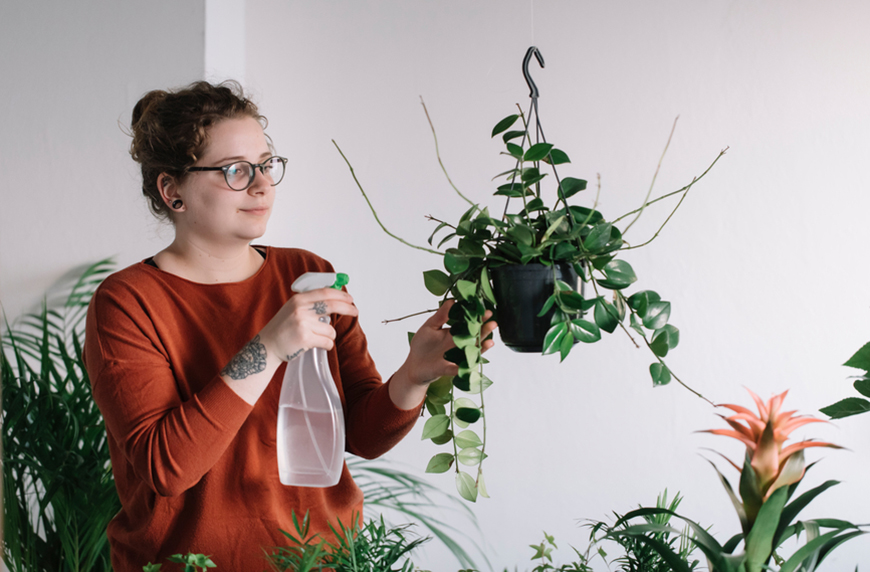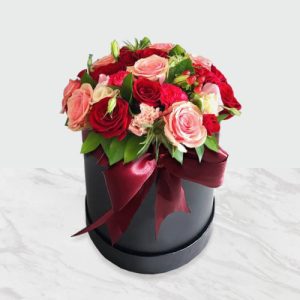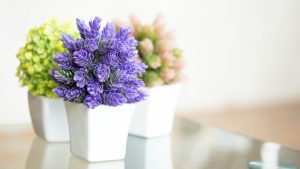In this article, we will explore common mistakes in caring for indoor plants. Join us as we delve into the world of apartment plant care.
Caring for indoor plants allows you to bring the beauty and freshness of nature into your home. Apartment plants are plants that can thrive and be cared for in indoor spaces, such as apartments and small houses. These beautiful and native plants bring the freshness and beauty of nature into our living spaces. In this article from “Gol Gift” website, we will look into the common mistakes in caring for apartment plants.
Apartment plants can purify indoor air, regulate humidity, and spread calming effects to their surroundings. Popular plants like Sansevieria, Pothos, Ficus, Philodendron, and Peperomia are commonly grown in apartments. Taking care of them is quite easy; with regular watering, suitable light, and proper soil, you can enjoy the beauty and vitality of apartment plants. Additionally, by selecting the right pots and placing the plants in strategic locations, you can adorn your indoor space and bring the freshness of nature into your home.
To read the article Click “Great gifts for men born in July”
Mistakes in Caring for Apartment Plants
Apartment plants are used for decorating and improving the living environment inside homes and apartments. These plants vary in size and their needs for light, water, and care. Most of them can thrive in suitable indoor conditions. Some apartment plants can also help in air purification and absorb harmful chemical compounds such as formaldehyde. To support their growth and care, they require proper lighting, regular watering, suitable soil, and adequate nutrition. Furthermore, it is essential to remove any polluted or dry leaves and protect the plants from pests and diseases. By understanding the needs of each plant, you can have various choices for decorating and beautifying your space. Let’s explore some common mistakes in caring for apartment plants:
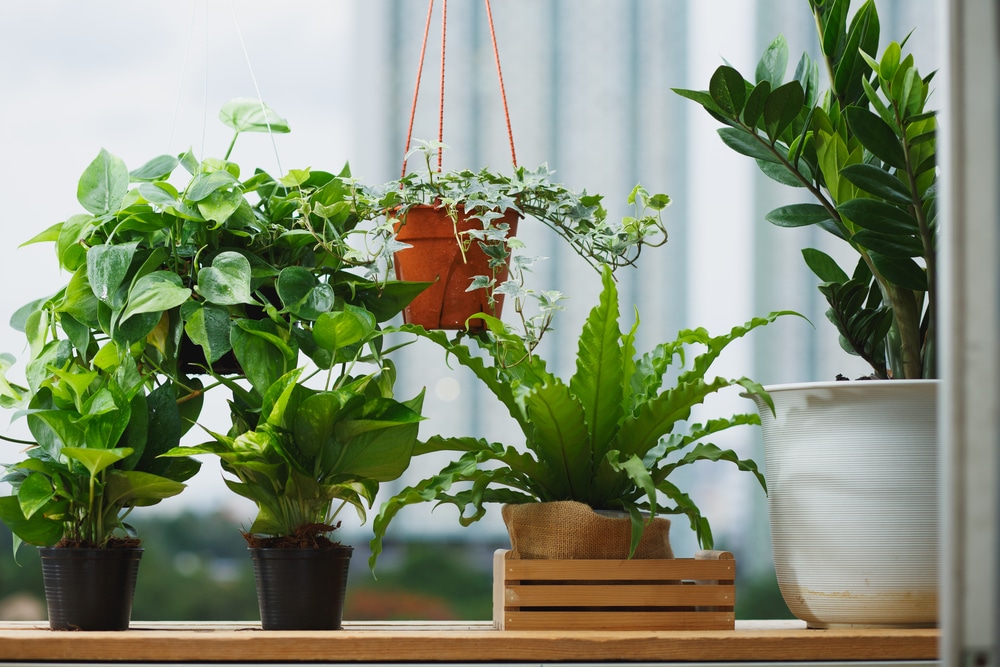
Overwatering Indoor Plants
One of the most common mistakes in caring for indoor plants is undoubtedly overwatering. This can happen due to insufficient knowledge of the plants’ water needs or forgetting to water them regularly. Overwatering can have various negative effects on the plants. Firstly, it can lead to suffocated and diseased roots, resulting in root rot, root cracking, and other issues. Secondly, excessive watering can cause the accumulation of excess salts in the soil, leading to salt toxicity in the plant.
Furthermore, overwatering deprives the roots of sufficient oxygen, disrupting the plant’s growth. To prevent overwatering, it’s crucial to understand each plant’s water requirements. Each plant has different water needs, and you should act accordingly. Additionally, before watering, make sure the top layer of soil has dried out and needs watering. Using automatic irrigation systems can also assist you in managing watering more effectively.
Excessive Use of Fertilizers
Common mistakes in caring for apartment plants include the excessive use of fertilizers. Although fertilizers can provide necessary nutrients to plants, using them excessively and continuously can create problems. Firstly, excessive use of fertilizers can lead to an accumulation of excessive salts in the soil, causing toxicity in the plant. This can result in root burn, disease occurrence, and plant wilting. Secondly, continuous fertilizer use can disrupt the balanced composition of the soil and lead to growth disturbances in plants.
Moreover, it may damage leaves and stems irreversibly. To prevent excessive use of fertilizers, you should pay attention to the nutritional needs of plants and adhere to proper timing for fertilization. Using organic fertilizers can be a suitable alternative to chemical fertilizers. Also, it is essential to regularly test the soil and examine the nutritional needs of plants to fertilize accurately and regularly. Finally, studying guidelines and consulting with experts can help you in the proper use of fertilizers and avoid common mistakes.
To read the article Click “The Most Beautiful Flowers You Can Choose to Give as a Gift”
Excessive Care of Plants
Another common mistake in caring for apartment plants is excessive care. Although most apartment plant enthusiasts are aware of the importance of care and nurturing, they may unintentionally go overboard. This can have negative effects on the growth and health of the plants.
Excessive care can include overwatering, excessive fertilizer use, overexposure to light, and even frequent touching and moving of the plants. These actions can lead to issues such as suffocated roots, leaf burn, yellowing leaves, dryness, and even plant death.
The most crucial aspect of caring for apartment plants is understanding their natural needs. Each plant has different requirements for light, water, heat, and humidity. Therefore, you must familiarize yourself with the needs of each plant and then care for them accordingly.
It’s best to pay attention to signs such as disproportionate growth, suffocated roots, yellowing leaves, dryness, and other symptoms. If the plant appears dry, you should water it, but if the soil is too moist, it’s better to refrain from watering. Caring for apartment plants is a delicate matter that requires balance and a proper understanding of the plants’ needs. By studying and learning about each plant species, you can prevent common mistakes of excessive care for your apartment plants.
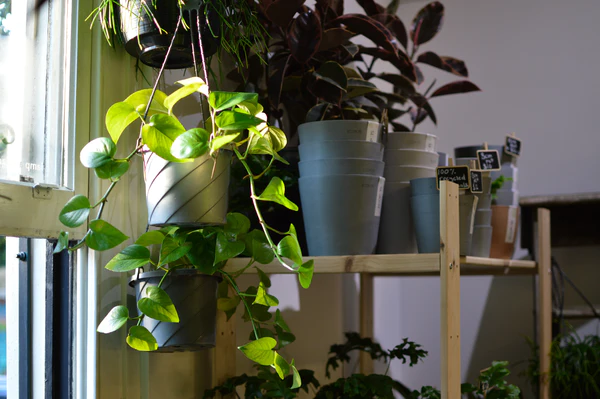
Neglecting to Repot Plants
One of the common mistakes in caring for apartment plants is neglecting to repot them. Due to lack of knowledge or carelessness, people may miss the opportunity to repot their plants. This can negatively impact the growth and health of the plants.
Over time, the pots of apartment plants can become compacted, trapping essential soil and organic materials needed for plant growth. Moreover, if you’ve chosen a larger pot for the plant, it may cause the soil to become excessively moist, making it difficult for the roots to receive necessary oxygen.
Repotting is crucial for enhancing the growth and health of plants. This process helps renew the soil, providing more space for root growth. Additionally, repotting can prevent issues related to uneven growth and suffocation of the roots.
It’s best to repot apartment plants every few months. Properly selecting the pot is also of utmost importance. The pot should have drainage holes to prevent excessive soil moisture. Also, use pots that are the appropriate size for the plants to allow their roots to grow well.
Order to send flowers and gifts to Shahrkado
Shahrkado is one of the most reliable collections through which you can send special and customized gifts, books and cultural gifts and gift packages to your loved ones inside Iran. Our colleagues at Shahrekado Collection are trying to prepare your orders as soon as possible and send them to your loved ones inside Iran. In addition, you can send flowers to your loved ones inside and outside of Iran in any city where they live through Shahrkado collection.
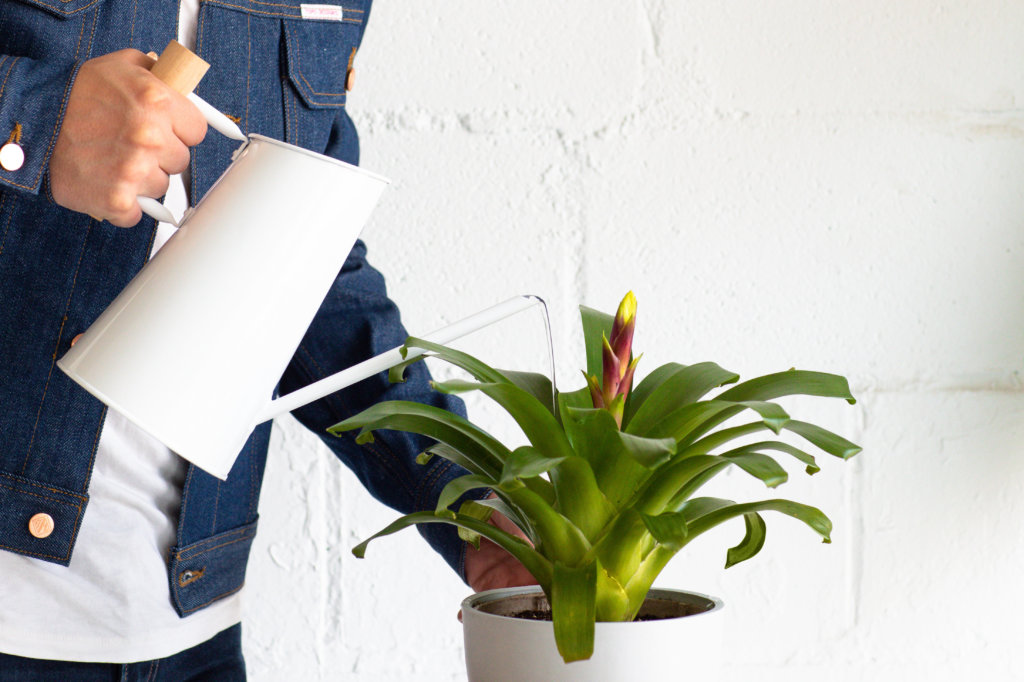
Conclusion:
Common mistakes in caring for apartment plants include overwatering, excessive use of fertilizers, neglecting to repot the plants, and excessive care. These mistakes can lead to issues such as suffocated roots, root rot, leaf burn, and uneven plant growth. To successfully care for apartment plants, we must understand their specific needs, water and fertilize them appropriately, consider repotting when necessary, and provide balanced care.
By taking these measures, we can ensure the health and vitality of our apartment plants, bringing the beauty and freshness of nature into our living spaces. Properly cared for plants not only enhance the aesthetics of our homes but also contribute to a calming and pleasant indoor environment. So, let’s pay attention to the needs of our apartment plants and avoid these common mistakes, allowing them to flourish and thrive in our living spaces.

